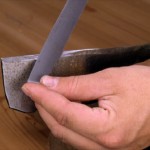Sharpening Tools – Get To The Point
 There are several ways to keep your woodworking tools sharp. Most are kept sharp by using an abrasive whetstone to wear the metal to a narrow cutting edge. The better-quality natural stones are more expensive, but you can get satisfactory results from cheaper, synthetic stones. As part of the sharpening, whetstones are lubricated with water or oils to make sure the steel does not overheat and to prevent fine particles of metal and stone from clogging the abrasive surface.
There are several ways to keep your woodworking tools sharp. Most are kept sharp by using an abrasive whetstone to wear the metal to a narrow cutting edge. The better-quality natural stones are more expensive, but you can get satisfactory results from cheaper, synthetic stones. As part of the sharpening, whetstones are lubricated with water or oils to make sure the steel does not overheat and to prevent fine particles of metal and stone from clogging the abrasive surface.
Generally, whetstones are sold as rectangular blocks – known as bench stones – for sharpening everyday tools or as small knife edges or teardrop section stones for honing gouges and carving chisels. Blades can also be sharpened on a perfectly flat metal plat that has been dusted with abrasive powder.
Oilstones
The majority of man-made and natural sharpening stones are lubricated with light oil. Novaculite generally considered to be the finest oilstones available are only found in Arkansas. This compact silica crystal occurs naturally in various grades. The course, mottled-gray Soft Arkansas stone removes metal quickly and is used for the preliminary shaping of edged tools. The white Hard Arkansas stone puts the honing angle on the cutting edge, which is then refined and polished with the Black Arkansas stone. Even finer is the rare translucent variety. Synthetic oilstones are made from sintered aluminum oxide or silicon carbide. Categorized as coarse, medium and find, man-made sharpening stones are far cheaper than their natural equivalents.
Waterstones
Because it is relatively soft and friable, a sharpening stone that is lubricated with water cuts faster than an equivalent oilstone; fresh abrasive particles are exposed and released constantly as a meta blade is rubbed across the surface of the waterstone. However, this soft bond also makes a waterstone vulnerable to accidental damage, especially when honing narrow chisels that could score the surface. Naturally occurring waterstones are so costly that most tool suppliers offer only the synthetic varieties which are almost as efficient.
Diamond stones
Extremely durable coarse – and fine-grade sharpening ‘stones’ comprise a nickel plated steel plate that is embedded with monocrystalline diamond particles and bonded to a rigid polycarbonate base. These fast-cutting sharpening tools, available as bench stones and narrow files, can be used dry or lubricated with water. Diamond stones will sharpen steel and carbide tools.
Metal lapping plates
Available as alternatives to conventional sharpening stones, oiled steel or cast-iron plates sprinkled with successively finer particles of silicon carbide produce an absolutely flat polished back to a plane or chisel blade and razor-sharp cutting edges. For the ultimate cutting edge on steel tools, finish with diamond-grit compound spread on a flat steel plate. Diamond abrasives are also used to hone carbide-tipped tools.
Exclusive $20 Discount on 16,000 woodworking plans and projects. Activate your discount now: TedsWoodworkingDiscount
Find us on Facebook
Categories
- Adhesives For Woodworking
- Beds
- Drills
- Hand Tools
- Hardwoods
- How to
- News
- Power Tools
- Routers
- Safety
- Safety and Health
- Sanders
- Saws
- Shed
- Sheds
- Softwoods
- wood joints types
- Woodwork Machineries
- Woodworking
- woodworking business
- Woodworking Crafts
- Woodworking Equipment
- Woodworking Plans
- Woodworking Projects
- Woodworking Tools
- Woodworking Videos
FREE PLAN!
Download your free Shed Plan here.
